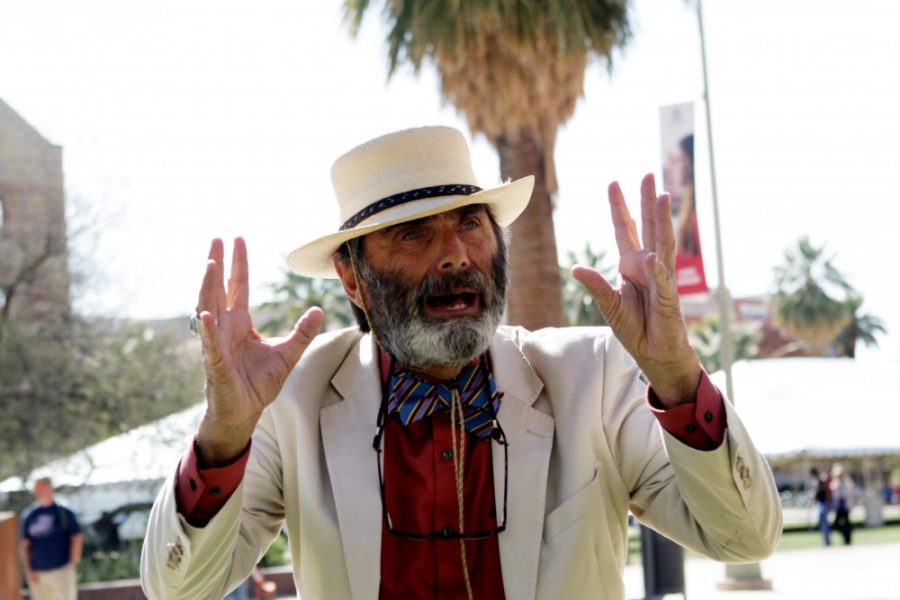Campus preachers have been a part of the UA campus environment for so long they are arguably a part of the campus’ legacy. Generation after generation of Wildcats were met on the UA Mall with Bible and sign-wielding preachers telling students they are sinners who are going to hell, or occasionally, that they even deserve rape.
Recently, some students and community members began calling for tighter restrictions on what can be said on the UA campus. A petition on Change.org asking UA President Ann Weaver Hart to remove the campus preachers has garnered over 1,000 signatures.
“I just think a line should be drawn when it comes to malice and threats, even if they draw it as a loose threat,” said Tanner Bonebrake, a freshman studying French. “If someone wears a ‘you deserve rape’ shirt, just because there [are] bible verses under it, it doesn’t mean it should be counted as free speech.”
Mikhail Savenko, a campus preacher better known as Brother Mikhail, said campus preachers are well within their First Amendment rights.
“We should definitely be able to be on this campus and share our ideas,” Savenko said. “I mean, if we definitely break some kind of law—if we harass people or chase after people — if we do something illegal, … we should be dealt with and arrested.”
Savenko added that if the UA does decide to restrict campus preachers, they will fight for their right to preach.
“If we have to, you know, sue the school or sue whoever we have to, we will do that,” Savenko said. “We care about free speech.”
The reason for the petition is that the aggressive tactics of campus preachers are causing students to feel unsafe and threatened while they are simply trying to walk from class to class.
Arizona law states that universities are public spaces and therefore public forums, so free speech is explicitly protected. The state, however, allows its public universities and colleges to establish free-speech zones, or particular areas on campus that are specifically designated as a public forum. Designated zones are away from portions of campus where demonstrations, loud speakers or other activity may be disruptive to daily campus life.
While most state universities have adopted these “free speech zones,” the UA hasn’t.
“I don’t think that any of us condone … the words that are being said or the things that are being said to students,” said Kathy Adams Reister, associate dean of students. “Unfortunately, you know, a majority of what is happening, as far as I know and that I have seen, is protected speech.
Dean Saxton, a former UA student and campus preacher more commonly known as Brother Dean, has recently moved his preaching operation north to Arizona State University.
Saxton, infamous for his confrontational preaching tactics and for yelling phrases like, “you deserve rape” and “God doesn’t love Muslims” at passing students, said that ASU’s free-speech zones restrict his ability to preach.
“ASU doesn’t really understand the concept of free speech right now,” Saxton said. “It’s a different dynamic at ASU preaching than it is at the UA.”
Saxton said there are parts of the ASU campus where the police and the dean of students won’t allow him to preach. According to Saxton, he frequently gets kicked out from certain spots.
“Well, there’s a lot of different places that ASU won’t let you preach. Although they say they allow it, they really don’t,” Saxton said. “The dean of students and the police just act in a different way.”
While a faction of campus is clearly calling for tighter free speech restrictions, others say that impeding free speech may not be the solution to the problem.
“As long as they’re not specifically targeting one person who is there talking or listening, I think it’s fine,” said Katie Beaumonte, a music sophomore. “As screwed up as it is, let them talk.”
Beaumonte said as long as the preachers don’t specifically target individual people or are profane, she thinks the preachers are fine on campus.
“I just think they might go away when people stop engaging,” she said.
Follow Sam Gross on Twitter.









